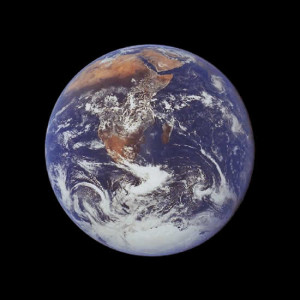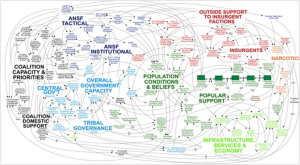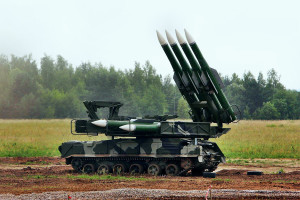Global Incoherence
By Greg Fisher
I was recently asked to take part in a roundtable co-organised by Nik Gowing and CIMA (the Chartered Institute for Management Accountants). The roundtable was designed to feed in to the Churchill 2015 conference in November, and was on the subject of ‘thinking the unthinkable’ with regard to global leadership. The premise, which I agree with, is that the world is changing rapidly, such that those in positions of authority who are meant to lead us through such problems are being overwhelmed by multiple wicked problems.
These wicked problems include: climate change; ISIS; the Arab Spring (which I see as a generally good thing); the financial crisis of 2008 and the ensuing global recession; and rising tensions between the West and Russia.
I thought I would share my thoughts, some of which I shared at the roundtable, on this (hugely complicated) subject via a blog article.
Ultimately, I see these wicked problems arising from a tension between two broad points: the world looks more like a closed system that is now hitting capacity constraints; and we are employing a ‘simple systems’ mind-set to what are complex system problems.
The World as a Single, Closed System
The first point is that the world is now behaving more like a single, closed system than at any point in human history. It isn’t actually a closed system because it is open to the sun’s energy but, if I were to put it bluntly, there is no longer any ‘outside’ from which we can import solutions and export problems. At the same time, feedback effects have become more pronounced, and the earth’s capacity constraints have begun to be tested by the simultaneous growth of the human population and its average per capita consumption.
 These features appear to have arisen from the stunning advances in transportation technology over the past hundred years or so and, more recently, by the advancement of information and communication technology. All of this has cultivated a much more integrated, interacting world.
These features appear to have arisen from the stunning advances in transportation technology over the past hundred years or so and, more recently, by the advancement of information and communication technology. All of this has cultivated a much more integrated, interacting world.
Prior to this, for several hundred years, the world was organised, both in a real and a legal sense, in to nation states, which operated – broadly speaking – like small open systems. In such a world, you can generally ignore the impact you have on the wider host system. You can also export some types of problem (sending convicts to other shores, for example) and import solutions to other types of problem (invading resource-rich countries, importing slaves etc.).
And, generally speaking, the more powerful countries were more able to seek solutions from their outside than the less powerful, and they could do this without any expectation of a significant detrimental response / feedback. Hence, empires were built.
We have moved away from this world for the reasons cited above: transportation technology, ICT, and increases in population and per capita consumption. Of course, the resulting wicked problems are not only important at the global level for national politicians and diplomats: they are also challenging the senior executives of organisations of varying sizes and types. The environment for many directors has changed, and continues to change, rapidly.
The ‘Simple Systems’ Mind-Set
The second point is that the dominant way of thinking in the world is reductionist, linear and static. Reductionism is the idea that we can break a whole system in to parts to understand it; linearity is the notion that cause is proportional to effect (i.e. small causes create small effects and vice versa); and by static I mean that dynamical effects are either ignored or under-emphasised.
In my opinion, this ‘simple systems’ thinking is demonstrated most clearly in orthodox Western economics. But economics is not merely an exemplar here, it is also important because it has widespread effects on corporations and governments all over the world. It frames decision making concerned with trillions of dollars of resources.
Now, an important point to note here is that the simple systems mind-set is a reasonable approximation for decision-making in the old world of multiple small open systems. Indeed, the relationship between the two is brought in to focus if we make the inverse point: we can imagine this simpler mind-set emerging in this old world as a reasonable approximation of how it works. Our pattern-recognition capabilities are, after all, concerned with reasonably approximate hypotheses.
In my opinion, and this is the core point of this article, the global wicked problems listed above have arisen because we are living in a world for which the simple systems mind-set is no longer a sufficient approximation. Among other things, the world in which we now live has no outsides, it is prone to cascading effects (like global financial crises) and acute feedback effects.
Examples

Bus No. 30, 7 July 2005
A few examples of wicked problems are worth dwelling on.
In yester-year, oil deficient countries could invade less militarily powerful nations without too much expectation of backlash. By contrast, in recent years, when oil-rich countries have been invaded we have seen such acts met by terrorism performed by members of the indigenous population who identified with the invaded country (cf the 7 July 2005 London bombings).
Climate change is the most obvious example of small, open systems externalizing their problems. This looks like a classic tragedy of the commons problem (although we should be careful of mapping metaphors).
Perhaps the most provocative example I would offer is the current Ukrainian crisis. Most people in the West now see this situation merely as Russian aggression but I think this aggression was a response to something. In my opinion, this crisis was cultivated by short-sighted Western foreign policy, starting with Western powers supporting an uprising against the democratically elected President of Ukraine, Viktor Yanukovych in February 2014.
With the passage of time, it is easy to associate Yanukovych with his alleged order to fire on civilians; however, it is important to delve in to the detailed chronology of what happened before this. The opposition forces had already rallied and it looked like they would overthrow Yanukovych (who, I reiterate, was democratically elected).
In all, it appears Western governments set aside their emphasis on democracy because they thought it suited them to have a pro-European president of Ukraine. After Yanukovych was overthrown, Western institutions supported the incumbent government (which had not been elected so it would be more accurate to describe what happened as a coup d’état) e.g. the IMF provided a $3.2bn loan in May 2014.
The point being made here is that Western foreign policy makers did not appear to imagine that Russia would respond by annexing the Crimea and supporting rebels in Eastern Ukraine. I would argue that this was because their thinking was based on simple system thinking, which includes a lack of foresight.
I hope readers see that none of these comments are intended to support Yanukovych firing on civilians, nor Putin’s action at home or abroad. I am merely shedding light on how myopic Western foreign policy was vis-à-vis supporting the ousting of Yanukovych.
Conclusion – What To Do?
My colleague, Rhett Gayle, adopted a pertinent word when we discussed this in preparing for the CIMA roundtable: coherence. I will expand on this in another article but here I will simply say that to survive and to be sustainable a system has to be coherent. What I mean by this is that the so-called parts of a system should not be working in conflict with each other (Francis Heylighen talks about ‘alignment’); rather they must be sufficiently consistent with each other to support existence and sustainability. This tension between the growing number of wicked problems in the world and the ubiquity of the simple systems mind-set points strongly towards a current state of global incoherence.
This leads us to an inevitable question: how do we move to a point of global coherence?
Simply put, we need to develop and use a mind-set which is more fitting of today’s complex world. It should not surprise readers to find me writing that the complexity sciences offer a lens to see the world in a way which is closer to how the world now works. It recognises system-wide emergent properties which reductionist strategies are blind to; it appreciates non-linearity where small changes to a system can give way to large changes; and it is appreciative of dynamical effects, among other things. It also teaches humility and caution.
I should emphasise, however, that while I view the complexity sciences as a better approximation of today’s reality than the simpler mind-set described above, I am not arguing that it’s perfect, as if it were the only answer we need for all time. Paraphrasing slightly, two of my colleagues (Paul Ormerod and Hank Sohota) have both pointed out that the simpler mind-set is a special case of a more complex perspective on the world. Human thought often evolves in this way (Einstein noted in one of his books that he saw classical physics as a special case of General Relativity, which holds for low speeds and low gravity). It is entirely possible that a subsequent way of thinking, which we cannot yet imagine, will come to hold complexity science as a special case.
But, in the meantime, I would argue that the complexity sciences are befitting of our time.



